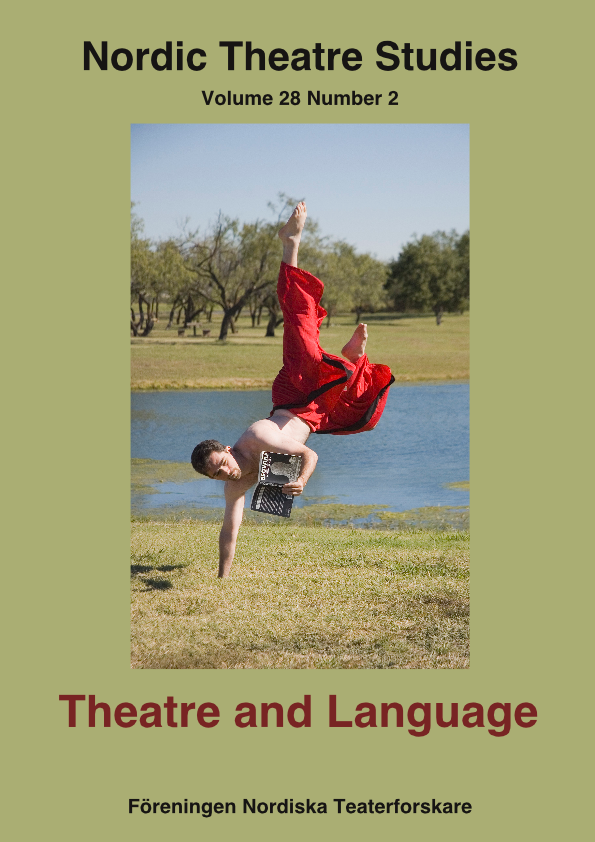Searching for a Space for Conversation: A study on how environment affects the articulation of the art experience among opera audiences at The Royal Danish Theatre
DOI:
https://doi.org/10.7146/nts.v28i2.25606Keywords:
Audience experience, qualitative methods, conversational space, environmental psychology, group conversations, art experienceAbstract
“Tell me about your experience in the theatre today”. Even though theatres (with this question) may seek honest, personal, and in depth answers from the audience, this question often results in superficial responds focused on what the audience suspect the theatre wants to hear. It can thus be difficult to get personal and detailed knowledge about the audiences’ experience. In a time, where theatres with different means (co-creation, participation etc.) try to keep audience loyal and engaged, this knowledge is important. In our project, we explore how different situations, locations, questions etc. affect conversations about art experiences and in this article we describe our “search for a space for conversation”. We explore how the space affects the conversation, and how the setting can emphasize certain elements. What happens to the conversation if we sit around an ordinary meeting table, if we walk and talk outside the art institution or if we talk inside the auditorium, where we had the original art experience? This explorative study is part of the project “A Suitcase of Methods”, which is housed by The Royal Danish Theatre and financially supported by The Bikuben Foundation.References
Boyatzis, Richard E. 1998. Transforming Qualitative Information, Thematic Analysis and Code Development. Thousand Oaks, CA: Sage Publications.
Cassidy, Tony. 1997. Environmental Psychology. Behaviour and Experience in Context. Hove, East Sussex: Psychology Press.
Ejgod Hansen & Louise & Møller Lindelof, Anja. 2015. ”Talking About Theatre: Audience Development Through Dialogue” in Participations, vol. 12 no. 1, 2015, 234—53.
Gallup. 2012. Det Kongelige Teater ― Styrkelse af forholdet til potentielle kunder, rapport 2012.
Gram, Nina & Lawaetz, Anna. 2016. ”From Visitor to Audience.” A Suitcase of Methods blog. https://asuitcaseofmethods.com/2015/10/06/from-visitor-to-audience/ accessed 28 October 2016.
Gröschel, Uwe. 2015. ”Researching audiences through Walking Fieldwork” in Participations, Journal of Audience & Reception Studies, vol. 12 no. 1, 2015.
Klie, Allan. 2016. "Det er teatrene, ikke pubikum, der svigter" in Berlingske, 11.2.2016.
Lawaetz, Anna & Esposito, Jakob & Nina Gram. 2016. ”Memory and Experience.” A Suitcase of Methods blog. https://asuitcaseofmethods.com/2016/07/08/experience-and-memory/ accessed 28 October 2016.
Lawaetz, Anna & Esposito, Jakob. 2016. ”Art Experience and Focus Group Composition.” A Suitcase of Methods blog. https://asuitcaseofmethods.com/2016/10/12/art-experience-and-focus-group-composition/ accessed 28 October 2016.
Lawaetz, Anna & Gram, Nina. 2016. ”Capturing the Audience Response – Walking, Talking and Drawing the Expereinced Relevance of Performing Arts.” A Suitcase of Methods blog. https://asuitcaseofmethods.com/2015/10/30/walking-talking-and-drawing-the-experienced-relevance-of-performing-arts/ accessed 28 October 2016.
Morgan, David L. 2012. ”Focus Groups and Social Interaction” in Interview Research. The Complexity of the Craft, 2. ed, 161–76. Thousand Oaks, CA: Sage Publications.
Proshansky, Harold & Ittelson, William & Rivlin, Leanne (Eds.). 1976. Environmental Psychology. People and Their Physical Settings. New York: Holt, Rinehardt and Winston, Inc.
Radbourne, Jennifer & Glow, Hilary & Johanson, Katya. 2013. The Audience Experience. Chicago: The University of Chicago Press.
Reason, Matthew. 2010. ”Asking the Audience: Audience Research and the Experience of Theatre” in About Performance.
Sauter, Willmar & Isaksson, Curt & Jansson, Lisbeth. 1986. Teaterögon. Publiken möter föreställningen upplevelse-utbud-vanor. Stockholm: Liber Förlag.
Sauter, Willmar. 1987. Braavo! En studie över publiken på Operan i Stockholm. Stockholm: Operan.
Downloads
Published
How to Cite
Issue
Section
License
The copyright belongs to the authors and Nordic Theatre Studies. Users can use, reuse and build upon the material published in the journal but only for non-commercial purposes. Users are allowed to link to the files, download the files, distribute the files on a local network (preferably by links), upload the files to local repositories if their institutions require them to do so, but not republish the files without proper agreements with the journal and the author.

